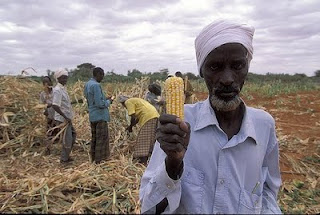
In what CNN has dubbed her “
biggest trip yet,” Secretary of State Hillary Clinton has commenced an
11-day, seven-nation tour of Africa that will take her to many of the continent’s most volatile states, including Kenya, South Africa, Angola, the Democratic Republic of Congo (DRC), Nigeria, Liberia, and Cape Verde.
Global hunger and food security are her top agenda items, as Clinton and African leaders discuss how the United States can help improve the continent’s agricultural sector. Also on the table will be the “Second Scramble for Africa“— the recent spate of developed nations buying up African agricultural land (map) to assure their access to adequate food supplies, which was the subject of a recent Wilson Center conference (video).
More Mouths to Feed
According to the Food and Agriculture Organization (FAO), one billion people are undernourished. If current population projections are correct, that figure is likely to grow. “In the coming 20 years alone, worldwide demand for food is expected to rise by 50 percent,” note Horand Knaup and Juliane von Mittelstaedt in Der Speigel.
Climate change will compound the already-daunting challenge of increasing food production by further “reducing harvests in much of the world, raising the specter of what some scientists are now calling a perpetual food crisis,” Joel K. Bourne, Jr. explains in National Geographic‘s special report, “The End of Plenty.”
Africa: Ground Zero
Sub-Saharan Africa—with birthrates averaging 5.4 children per woman and a farming sector dominated by small producers whose average yield per hectare has remained constant over the last 40 years—is particularly vulnerable to such a crisis. Both Secretary Clinton and President Obama have pushed for increased investment in the continent’s agricultural sector.
“There is no reason why Africa cannot be self-sufficient when it comes to food,” said Obama at the conclusion of this month’s G8 summit in L’Aquila, Italy. “It has sufficient arable land. What’s lacking is the right seeds, the right irrigation, but also the kinds of institutional mechanisms that ensure that a farmer is going to be able to grow crops, get them to market, get a fair price.”
Launching his book on African food security, Enough! Why the World’s Poorest Starve in an Age of Plenty, coauthor Roger Thurow told a Wilson Center audience, “We hope to provide both an instructional and inspirational tale to show that hunger today is largely man-made, that so much is also caused by policies and decisions that span the political spectrum, and to inspire by showing hunger is truly achievable to conquer.”
Pledges of Aid, but Land Grab Continues
Largely thanks to Obama’s prodding, G8 countries agreed to invest $20 billion for farm aid in developing countries over the next three years. However, the leaders were unable to agree on a set of shared principles regarding foreign acquisition of arable land.
A number of relatively wealthy but land- and water-strapped nations, including Saudi Arabia, China, South Korea, and the United Arab Emirates, as well as many corporations and other investors, have purchased millions of hectares of land in other developing countries. Asia and South America have been targeted by some, but the inexpensive, fertile land of impoverished Africa appears to be the primary prize.
While some might praise the transfer of land to those with the capital and technology to make it productive, questions abound when one considers the dual pressures of population growth and a changing climate. “[W]hat happens with famine strikes these countries? Will the wealthy foreigners install electric fences around their fields, and will armed guards escort crop shipments out of the country?” ask Knaup and von Mittelstaedt.
The Ethics of Land-Grabbing
In completing such transactions, governments often ignore customary land tenure, selling tracts that are already inhabited and cultivated by small-scale subsistence farmers whose families have lived on the land for generations, but who have no formal deed of ownership.
To prevent such exploitation, experts have suggested the adoption of international rules to govern foreign acquisition of agricultural land in the developing world. A report from the International Food Policy Research Institute recommends a broad swath of measures to ensure transparency, respect for existing land rights, benefit-sharing, environmental sustainability, and adherence to national trade policies.
The Devil Is in the Details
Adding to the strong statements by the G-8 and Secretary Clinton, the FAO plans to convene an international food security summit in Rome this November, which will call for the eradication of hunger by 2025. While these are welcome developments, the details remain unclear.The New Security Beat welcomes your comments on these important questions.
Photo: Men gather corn at a farm in Kenya. Courtesy Curt Carnemark and Flickr user World Bank (pool).
 In what CNN has dubbed her “biggest trip yet,” Secretary of State Hillary Clinton has commenced an 11-day, seven-nation tour of Africa that will take her to many of the continent’s most volatile states, including Kenya, South Africa, Angola, the Democratic Republic of Congo (DRC), Nigeria, Liberia, and Cape Verde.
In what CNN has dubbed her “biggest trip yet,” Secretary of State Hillary Clinton has commenced an 11-day, seven-nation tour of Africa that will take her to many of the continent’s most volatile states, including Kenya, South Africa, Angola, the Democratic Republic of Congo (DRC), Nigeria, Liberia, and Cape Verde. A Publication of the Stimson Center.
A Publication of the Stimson Center.




